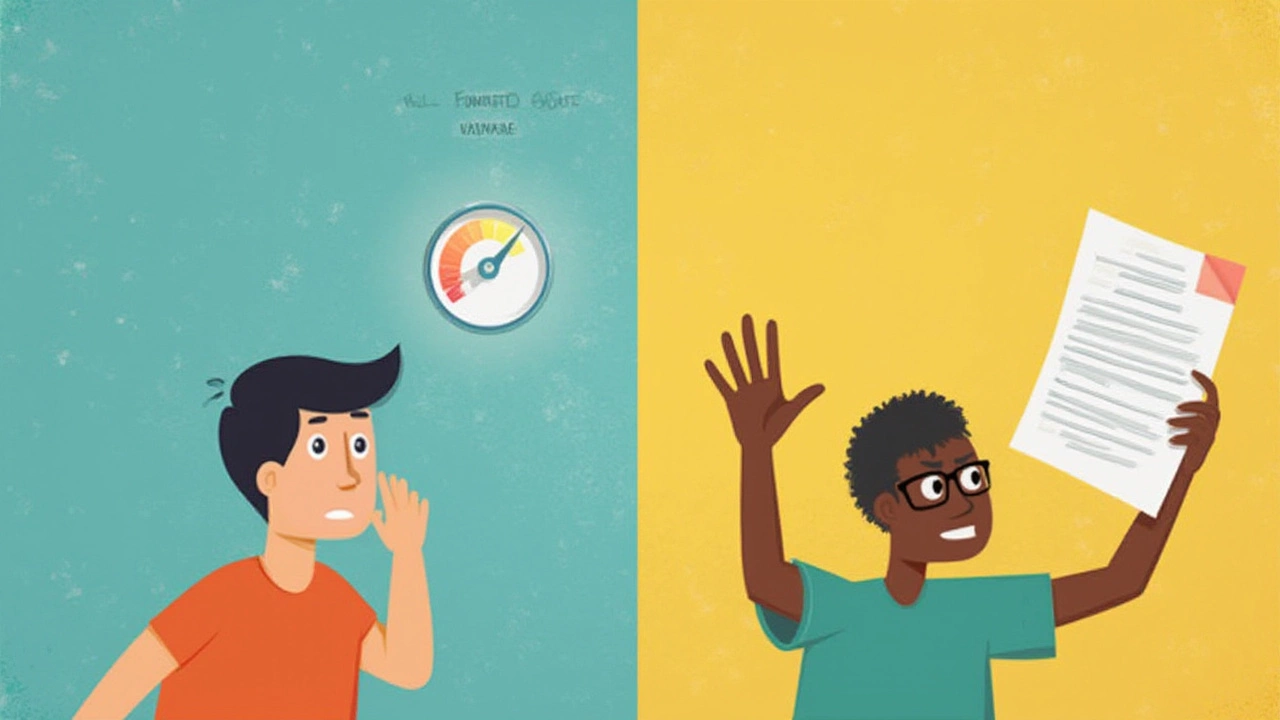Imagine landing your dream government job only to be tripped up by your credit score. Sounds unfair, right? But yes, agencies do look at credit history, and it can feel like you’re applying for both a job and a loan. Let’s pull back the curtain on how credit scores play into government job applications, which roles actually care, and what real people have faced when finance meets federal hiring.
Does Your Credit Score Matter for Government Jobs?
There’s this idea floating around that you need a stellar credit score just to work for the government. Here’s the real deal: Most government jobs don’t slap a strict number on your credit score. If you’re applying to be a park ranger or a post office clerk, it’s your experience and interview skills that’ll get you the offer. But, the closer your job gets to handling cash, sensitive information, or national security, the more your credit report matters.
Federal jobs in law enforcement, the IRS, banking regulation, or those needing a security clearance will almost always peek at your finances. Not to judge, but to assess risk. They want to be sure you won’t be tempted to cut corners—or worse—because of financial problems. Unpaid debts, defaulted loans, bankruptcies, or a pattern of late payments show up as red flags.
So what is the magic number? Surprise—there really isn’t one written in stone. The U.S. Office of Personnel Management (OPM) doesn’t publish a cutoff. Instead, credit is part of the “suitability” check, and your whole story counts. Context matters way more than a simple score. Had a medical crisis that tanked your credit? Explain it. The hiring panel might listen.
The best-known situations where a credit score is part of the picture are jobs requiring a security clearance. According to the Defense Counterintelligence and Security Agency, around 22% of security clearance rejections in 2022 cited financial issues—but rarely outright due to low score alone. Chronic issues, patterns of dishonesty, or debts that seem out of control are showstoppers. For most positions, you won’t even be asked for a credit check unless you’re handling taxpayer money, high-level secrets, or law enforcement authority.
There are documented cases where debts didn’t matter—people with credit scores in the mid-500s got cleared, while others with higher scores but unexplained debts did not. Even then, what matters is honesty and effort to fix issues. Applicants are usually given a chance to explain their situation—in writing or even in person.
Don’t confuse a background check with a full financial review. The typical background investigation looks for evidence of responsible behavior—not just credit score digits. Not sure if the job you want checks credit? You can ask the HR rep up front. It won’t hurt your application, and shows you’re proactive.
Here’s a quick table summarizing which federal jobs typically check credit and which usually skip it:
| Job Type | Credit Check? | Why |
|---|---|---|
| Postal Worker, Administrative Staff | Not Usually | Little-to-no handling of sensitive finances or security. |
| FBI, Law Enforcement | Yes | Trusted with confidential info, weapons, authority. |
| IRS, Treasury, Banking Regulator | Yes | Deal with money, taxpayer data, or regulations. |
| Low-level Clerical Jobs | Rarely | Minimal risk to agency if applicant has money issues. |
| Jobs Requiring Security Clearance | Always | Financial stress can be a blackmail risk or a liability. |

What Happens If Your Credit Isn’t Perfect?
A lot of people stress over old debts or low numbers, thinking they’ll be immediately blacklisted. In reality, federal agencies know life gets messy. Medical bills, layoffs, even student loans—the government has seen it all. It’s the habits that count, not a single score.
If you’re flagged in a background check, it just means a real person will look at your entire situation. They’ll want to know: Did you ignore your debts, or did you try to fix things? Did you rack up credit cards out of control, or did you lose your job during a recession and fall behind? The difference is everything.
Here’s what hiring managers really care about:
- Pattern of responsibility: Do your bills get paid eventually? Missed payments over years worry them more than a single slip-up.
- Current action: Are you working to clear things up—payment plans, disputes, settlements?
- Type of debt: Medical debt or student loans are less concerning than unpaid taxes or legal judgments.
- Honesty: Did you disclose what needed to be disclosed when asked?
I’ve talked to people who got through with scores barely hitting 600 and others who cleared top-level checks by documenting every step they were taking to fix old debts. A pile of documentation, letters from creditors, and proof of payment plans are your best defense if your credit looks rough. Don’t try to hide a thing—agencies can see much of your credit anyway.
A fun fact: In 2023, a report from the Federal Employee Viewpoint Survey noted that 38% of federal job applicants worried their credit would hold them back—but of those, nearly 70% were hired anyway. Numbers tell a story, not the full story.
If your credit isn’t what you wish it was, here’s what you can do before applying:
- Get a free credit report (annualcreditreport.com is legit and recognized by the government).
- Scan it for errors—like mistaken late payments or balances that aren’t yours. Dispute anything false.
- If there are genuine issues, write out explanations ahead of time. Be specific—dates, events, payments made, intentions to improve.
- Start payment plans with creditors if possible, and keep receipts.
- Don’t apply for new debt or let credit pull inquiries spike right before the background check.
And if you’re currently in the application process, don’t panic. Some government job offers even include a tailored statement about “suitability” reviews, especially for credit. If you get a notice to provide more info about your credit, respond quickly, honestly, and with as much detail as you can provide. Being up front helps your case—honesty is the number one value federal agencies look for in background checks, far above perfect finances.
Remember too that each state and agency can have its own approach. While the federal government doesn’t use a set cutoff score, state government jobs or contractors may have more rigid rules. If you’re not sure, ask. Agencies are used to these questions and usually happy to give you an idea of what matters in their specific world.

Tips and Myths: Getting Ready for Your Government Job Application
There’s so much talk, and way too many myths, about government jobs and credit scores. Let’s clear a few of the most stubborn ones right here:
- Myth #1: “You need a 700+ credit score for a government job.” False—there’s no magic number. Responsible behavior, proven effort, and honesty matter far more than hitting exactly 700.
- Myth #2: “A bankruptcy automatically disqualifies you.” Not true. The government looks at what caused the bankruptcy and what you did afterward. If you can show you’re handling things now, it’s possible to get hired—even in security-cleared positions.
- Myth #3: “If I have a student loan in default, I can’t get hired.” This one is half-true. If you’re working with your loan servicer to fix the default, you’re much better off than someone ignoring the debt. Federal agencies appreciate honesty and action, not perfection.
- Myth #4: “Credit checks happen for all jobs.” Not every role needs a credit check—ask your HR contact.
Quick tip: When in doubt, take control of your own story. Prepare explanations, gather documentation, and be ready to answer financial questions. Don’t let fear of your credit past stop you from applying—you might be surprised how flexible agencies actually are, especially if you’re a good match for the role.
Ready for another real-life stat? In 2024, over 2.6 million background checks were run for federal jobs. Of those, only a tiny fraction were rejected due to personal finances, and almost always for newer, unresolved, or suspicious debts. If you’ve worked to pay back debts, or they’re understandable (think hospital bills after a family emergency), your application is still very much alive.
One of the best things you can do before applying for a government job is to get organized—grab your credit report, highlight trouble spots, and jot down explanations wherever needed. If you have old collections or debts, keep proof that you’ve paid or started payment plans. A strong paper trail makes your life ten times easier if someone calls you in for a follow-up about your finances.
If you’re prepping for a job in law enforcement, national security, or anywhere with a security clearance, dig deeper. Agencies may want to see tax returns, paystubs, and even ask about household members’ finances. Being ready with those docs helps keep your application speeding forward.
And one last truth: the government values people who deal with setbacks and get back on track. They know life throws curveballs. They want to know you’re trustworthy, steady, and honest, not just someone who never had a rough month. Don’t let social media horror stories scare you—you’re competing with real people who have real lives and real bumps in the road.
So don’t let a number hold you back from chasing that government gig. Be upfront, be organized, and put your best foot forward—you might be surprised how far you can go, credit warts and all.
